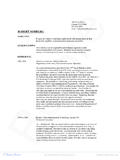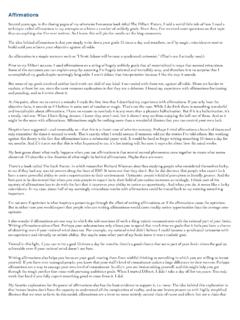Transcription of The Proper Basicality of Moral Values - Paul Copan
1 141 7 God, naturalism , and the foundations of MoralityPaul CopanFrench Catholic philosopher Jacques Maritain helped draft the United Nations Declaration of Human Rights (1948), which recognizes the inherent dignity and the equal and inalienable rights of all members of the human family. Further, it affirms: All human beings are born free and equal in dignity and rights. They are endowed with reason and conscience and should act towards one another in a spirit of brotherhood. What is missing, though, is any foundation or basis for human dignity and rights. In light of the philosophical discussion behind the drafting of the Declara-tion, Maritain wrote: We agree on these rights, providing we are not asked why. With the why, the dispute begins. 1 The dispute about morality involves a host of questions about whether objective/universal Moral Values exist and whether humans have dignity and rights and if so, what their source is.
2 Are Moral Values emergent properties, supervening upon natural processes and social configurations, or are beliefs about Moral Values an adaptation hard-wired into human beings who, like other organisms, fight, feed, flee, and reproduce? Does God offer any metaphysical foundation for Moral Values and human dig-nity, or can a Platonic, Aristotelian, categorical imperative (Kantian), or Ideal Observer ethic adequately account for them?This essay argues, first, that objective Moral Values are an inescapable, properly basic bedrock. Moral subjectivism is inadequate to account for our fundamental intuitions, including ones about evil. Second, certain Future_Body 1417/24/08 3:34:38 PM142 t h e f u t u r e o f at h e i s mnaturalistic Moral realists commonly confuse the order of knowing with the order of being.
3 Since all humans are God s image-bearers, it isn t surprising that they are capable of recognizing or knowing the same sorts of Moral Values whether theists or not. The metaphysical question is the more fundamental: How did there come to be morally responsible persons in the absence of God and as products of valueless processes? I would maintain that a Moral universe is far less likely indeed extremely difficult to come by if God does not exist. naturalism provides a poor context for objective Moral Values , duties, and human dignity. Third, in various ways, naturalism undermines objective ethics despite attempts to root it in science. Fourth, a naturalistic evolutionary account of morality fails to engage our deepest Moral intuitions about right and wrong, and it leaves us skeptical about whether we can have confidence about fundamental epistemic and Moral convictions.
4 Any confidence would borrow metaphysical capital from a worldview like theism, as humans have been made in the image of a faithful, truthful, and rational Being. Finally, despite the claims of naturalistic Moral realists, any appeals to Plato s Euthyphro dilemma fail to render God superfluous in account-ing for the source of objective Moral Moral universe and human dignity are best explained in the context of a morally excellent, worship-worthy Being as their metaphysical founda-tion, as opposed to nontheistic alternatives,2 and naturalism in If objective Moral Values and human dignity and rights are a reality (and there is very good reason to think they are), then it is extremely likely that some intrinsically valuable Being and Creator exists. The Proper Basicality of Moral ValuesWe are wise to assume that our senses, our powers of reasoning, and our most fundamental Moral instincts are not systematically deceiving us.
5 We should and typically do take for granted their adequate function. Indeed, even the most radical skeptic assumes this as he confidently draws his skeptical conclusions. He appropriates various logical laws to prove his point and, no doubt believing those claiming to have knowledge to be in error, presumes that others ought to share his inferences. Whatever epis-temological blunders humans may make, they are not sufficient to justify a deep skepticism. Yes, humans may misperceive or make logical missteps. However, such mistakes hardly call into question the general reliability of our sense or reasoning powers; indeed, they presuppose it. The ability to detect error presumes an awareness of truth. Likewise, despite flawed Moral judgments, there still are certain Moral truths that we can t not know unless we suppress our conscience or engage in We possess an in-built yuck factor basic Moral Future_Body 1427/24/08 3:34:38 PMg o d, naturalism , a n d t h e f o u n d at i on s o f morality 143intuitions about the wrongness of torturing babies for fun, of raping, mur-dering, or abusing children.
6 We can also recognize the virtue of kindness or selflessness, the obligation to treat others as we would want to be treated, and the Moral difference between Mother Teresa and Josef Stalin. Those not recognizing such truths as properly basic are simply wrong and morally dysfunctional. We need no social contract or established methodology to recognize the rights of all humans before the law as well as the wrongness of racism or ethnocentricism. For instance, blacks had value before any civil rights legislation in the United States or South Africa. We can agree with Nicholas Rescher, who observes that if members of a particular tribe think that sacrificing firstborn children is acceptable, then their grasp on the conception of morality is somewhere between inadequate and nonex-istent.
7 5 Morality isn t a superficial feature of our world. Atheist David O. Brink asserts, Our commitment to the objectivity of ethics is a deep one. 6 Kai Nielsen deems such a Moral awareness to be bedrock :It is more reasonable to believe such elemental things [as wife-beating and child abuse] to be evil than to believe any skeptical theory that tells us we cannot know or reasonably believe any of these things to be evil.. I firmly believe that this is bedrock and right and that anyone who does not believe it cannot have probed deeply enough into the grounds of his Moral That is, basic Moral principles are discovered, not invented, and persons with a decently functioning conscience can get a lot of Moral things right. As C. S. Lewis has pointed out, law codes across civilizations and through-out history (Egyptian, Babylonian, Greek, Native American, and so on) reveal a continual resurfacing of the same basic Moral standards do not murder, break promises, take another s property, or Despite our faulty Moral judgments, we would be wrong to abandon the quest for good-ness or become Moral skeptics: we cannot always or even usually be totally mistaken about goodness, Robert Adams Such an affirmation of human dignity, rights,10 and duties is something we would readily expect if God exists but not if humans have emerged from valueless, mindless processes (more below).
8 The Jewish-Christian Scriptures assume that humans are morally responsible agents who can generally know what is good and that we ought to do it. The prophet Amos delivers severe divine warnings to surrounding Gentile nations for their atrocities and crimes against humanity ripping open pregnant women, breaking treaties, acting treacherously, stifling compassion. The underlying assumption is that these nations even without God s special revelation should have known better (Amos 1 2). The same perspective Future_Body 1437/24/08 3:34:38 PM144 t h e f u t u r e o f at h e i s mis expressed more explicitly by Paul, who speaks of Gentiles without the Law of Moses who still have a law a conscience written in their hearts (Rom. 2:14-15).Philosopher Thomas Reid argued that basic Moral principles such as, treat another as you desire to be treated, are simply commonsensical obvious to those who have not ignored their conscience.
9 He claimed he did not know by what reasoning demonstrative or probable he could convince the epistemic or Moral skeptic: The sceptic asks me, Why do you believe the existence of the exter-nal object which you perceive? This belief, sir, is none of my manu-facture; it came from the mint of Nature; it bears her image and superscription; and, if it is not right, the fault is not mine. I ever took it upon trust, and without to Reid, morality begins with certain axioms or first prin-ciples, which are self-evident to the properly functioning human being. To reject God s law written on our hearts (the conscience with its fundamen-tal inclinations) is to act Being God s image-bearer, the athe-ist can recognize the same Moral truths as the theist because this faculty [is] given him by God.
10 If God had not bestowed this faculty upon humans, none of us would be a Moral and accountable being. 13 Although basic Moral principles to be kind, selfless, and compassionate; to avoid tortur-ing for fun, raping, or taking innocent human life are accessible and knowable to morally sensitive human beings, some improperly function-ing individuals may be self-deceived or hard-hearted sophists. Thus, we should reasonably believe what is apparent or obvious to us unless there are overriding reasons to dismiss it (the credulity principle) a belief that applies to our sense perception, our reasoning faculty, and our Moral intuitions/perceptions. In general, we take for granted the inno-cence of these capacities until they are proven guilty. We should accept their testimony unless we have strong reasons to doubt them.





